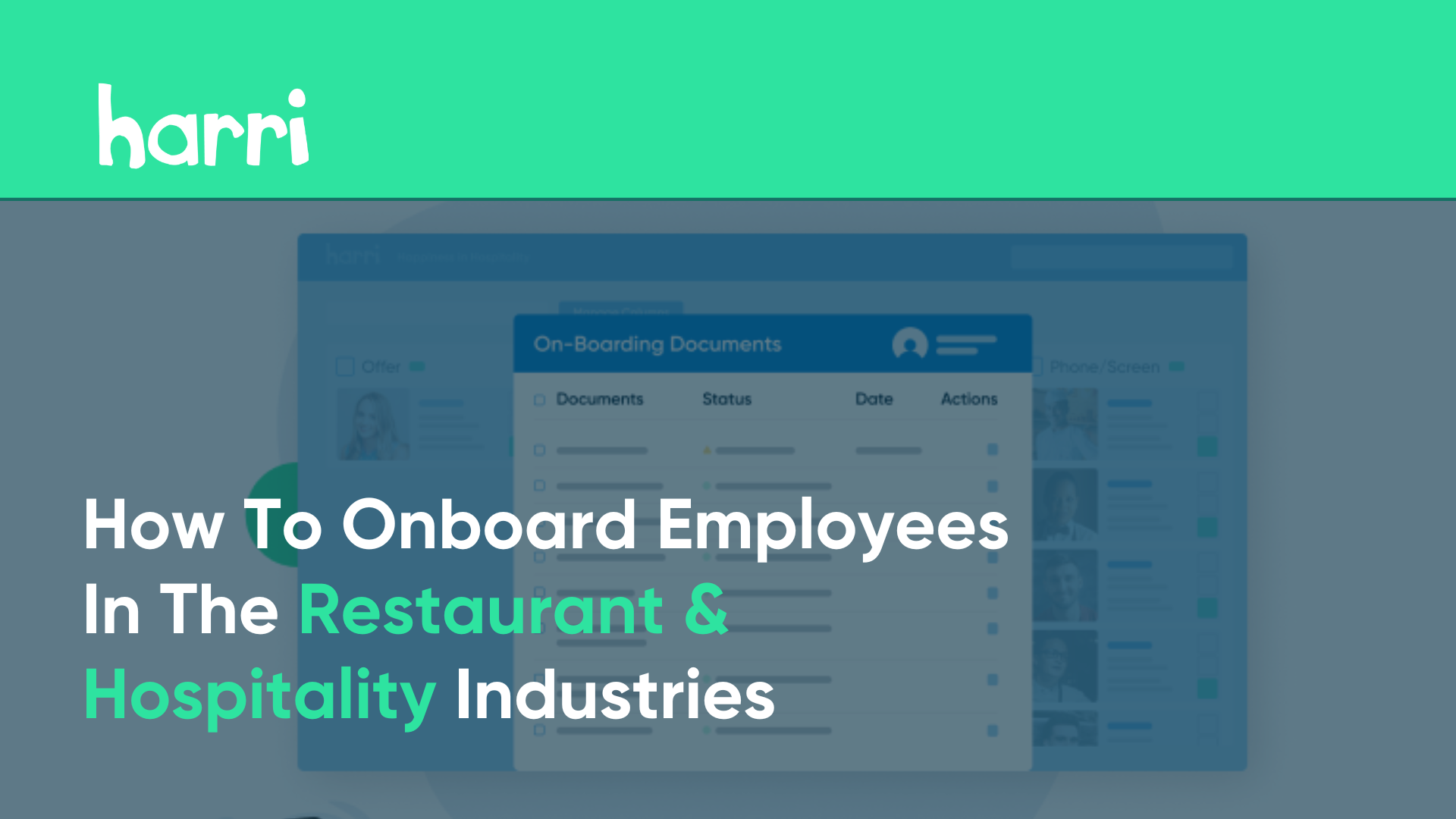How to Onboard Employees in the Restaurant and Hospitality Industries

- By Harri Insider Team | February 14, 2023
How to Build a New Employee Onboarding Process
Often underestimated, the employee onboarding process is just as important as interviewing and vetting candidates. Effective onboarding is pivotal to business success, particularly in the restaurant and hospitality industries, where it can dramatically influence staff retention and productivity.
Most restaurants struggle with seamlessly integrating new hires, training them to meet expectations, and retaining them for more than a year. Missteps in the onboarding process can drive employees towards competitors, while a well-executed strategy enhances employee retention, boosts productivity, and attracts more workers through positive referrals.
Implementing top onboarding software, organizing welcoming meet-and-greets, and fostering open dialogues are essential components. Despite their importance, many restaurant and hotel managers overlook these important aspects of onboarding. Below, we provide a brief look at onboarding, why it is so important, and the onboarding best practices that maximize contributions from new hires.
What is Onboarding, and Why It Matters
Onboarding is the process of instilling knowledge and skills to new hires. The aim of onboarding is to train employees to the point that they can operate at least semi-autonomously, and make a meaningful difference in your organization. The onboarding process begins the moment an employee shows up for their first day of work. The onboarding process includes, but is not limited to:
- The completion of paperwork
- Engaging in training sessions
- Interacting with coworkers
- Developing an understanding of how work is completed
Unlike orientation, which typically spans the first week of employment, onboarding can extend over a month or more, depending on the role’s complexity. Utilizing the best onboarding software for the hospital industry can significantly streamline this critical period, saving time and enhancing efficiency—an essential consideration for any business owner.
The primary goal of onboarding is to integrate new hires into the company culture, helping them grasp the nuances of your operational standards. This integration is crucial for enabling new employees to contribute effectively to the company’s success. A successful onboarding process not only helps new hires understand their roles but also fosters relationships with colleagues, setting a solid foundation for teamwork and productivity.
10 best practices for employee onboarding
Your unique approach to the employee onboarding process shapes new hires’ perception of the organization. Prepare ahead of time, by going over the list of tips below and you’ll succeed in onboarding new additions. Without further ado, here is a quick look at the best practices for onboarding new employees to your restaurant or other hospitality industry business.
1. Prepare ahead of time
Start preparations before the new hire’s first day to ensure a seamless onboarding process. Early preparation reduces the learning curve and enhances retention prospects.
2. Refine the welcoming process
First impressions are crucial. Develop a welcoming process that includes an introductory package, workspace preparation, and meet-and-greets with team members to leave a lasting positive impact.
3. Take guidance from leaders
Involving senior leaders in the onboarding process demonstrates to new hires that they are valued, helping to impart the organization’s culture and expectations effectively.
4. Utilize onboarding software
Leverage technology to streamline the onboarding process with Harri’s onboarding software, designed specifically for the hospitality industry. This advanced tool simplifies administrative tasks, enriches training resources, and enhances the overall experience for new hires. By integrating Harri’s software, businesses can ensure a smoother transition for employees, leading to faster productivity and improved engagement.
5. Encourage questions from new hires
Promote a two-way dialogue where new hires feel comfortable asking questions and providing input, which can be invaluable for their integration and your understanding of their needs.
6. Foster relationships and rapport
Encourage bonding among team members through social interactions and team-building activities, fostering a foundation of trust and cooperation.
7. Gradual introduction to work
Instead of overwhelming new hires from day one, gradually introduce them to their responsibilities. This phased approach helps them adjust and ultimately contribute more effectively.
8. Offer diverse learning activities
Enhance engagement by incorporating varied learning methods such as video tutorials, webinars, Q&A sessions, and hands-on practice, which cater to different learning preferences.
9. Maintain open communication
New hires appreciate the opportunity to be heard. Invite feedback concerning the onboarding and training processes then implement that feedback into subsequent onboarding sessions. Resist the temptation to resort to authoritative monologues, and engage in constructive dialogues and the conversation will prove productive for both parties.
10. Digitize your onboarding process
Integrate digital tools to make the onboarding process more efficient and flexible. Digital resources can provide new hires with essential information and support without overwhelming your staff.
Digitizing the onboarding process offers a multitude of benefits that enhance both the effectiveness and the experience for new hires and your team:
Efficiency and Flexibility: Digital tools streamline the onboarding process, making it more efficient and adaptable to different learning styles and paces.
Cost-Effectiveness: Reduces the need to dedicate extensive staff time to onboarding, allowing for better allocation of resources.
Support for Visual Learners: Appeals to new hires who prefer visual learning formats over traditional face-to-face interactions.
Accessibility of Information: Digital and tangible copies of onboarding materials can be easily accessed by new hires at their convenience.
Automation: Digitization partially automates the onboarding process, reducing the risk of human error and ensuring consistency across the board.
Enhanced Interaction: Allows for the personalization of the onboarding experience with options for one-on-one or group interactions, even remotely.
Increased Productivity: Frees up existing employees to focus on productive tasks rather than solely on training new hires.
Improved Engagement: Engaging digital content can keep new hires interested and motivated throughout the learning process.
Simplified Hospitality Onboarding with Harri
You are not alone in the quest to add productive new hires to your team. You can streamline the onboarding process for restaurants, hotels, and retailers by reducing administrative overhead and providing a smooth experience for new hires with Harri. Our comprehensive onboarding solution for hospitality includes a digitized system, payroll & HRIS integrations, automated Right to Work verification and more!
If you’re ready to meet Harri and see what we can do for your business, request a demo with our team today!




















